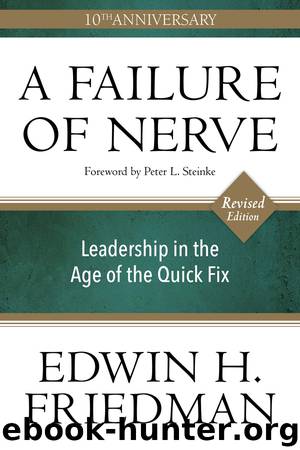A Failure of Nerve: Leadership in the Age of the Quick Fix, Revised Edition by Friedman Edwin H

Author:Friedman, Edwin H.
Language: eng
Format: epub
Publisher: Church Publishing Inc.
Published: 2017-04-30T16:00:00+00:00
Madness, therefore, cannot be judged by strange ideas, outlandish theories, unpopular values, or even irrational beliefs—the favorite categories of the social scientists. While these matters of the intellect are products of the cortex, when conditions are right, the cortex can be working at the service of the lower brain. This shows up blatantly with highly intelligent families whose brilliance, instead of serving them well in their efforts to function in more healthy ways, actually seems to intensify their unhealthy ways of thinking and relating. Madness has more to do with how people function in a relationship system than with products of their intellect. After all, judging madness on the basis of beliefs and values puts one in a relativistic position. In addition, if everything is relative, in any family or institutional disagreement a leader cannot go around simply dismissing all disagreement as madness.
If, however, a leader focuses on the way people function in a relationship system rather than on their stated values and beliefs, he or she can develop a more objective perspective on the madness of others. The three criteria of reptilian functioning that leaders of any family or institution can always rely on to judge madness (of others or their own) are
interfering in the relationships of others;
unceasingly trying to convert others to their own point of view; and
being unable to relate to people who do not agree with them.
These criteria are universal rather than relative and totally transcend the social science categories of virtual reality. They are evidence of regression in all cultures, genders, ages, and races, at any period in the history of our species. For they are all products of anxiety and therefore are rooted in the automatic reactivity of the reptilian brain rather than the more considered deliberations of the cortex, no matter how rationally they are phrased or how deliberately they are delivered. Furthermore, it is not as though some people exhibit these characteristics and some do not; we all have areas of, or moments in, our lives where, when we become anxious enough, we tend to behave in a “reptilian” manner.
As a CEO from Texas put it after hearing about McLean’s views on the brain,
I was fond of using the circle-the-herd model when I wanted to “round up” my managers. If you bring in the herd, and find you have left one or two stragglers, it is very hard to get them to come in alone unless you take the entire herd out, circle them ’round again, and have the togetherness forces gather the stragglers in with their “colleagues.” I never knew why it didn’t work with some of my branch chiefs, but now I understand. Circling the herd works on the mammalian brain, and I’ve been trying to use it on reptiles— rattlers, no less.
Download
This site does not store any files on its server. We only index and link to content provided by other sites. Please contact the content providers to delete copyright contents if any and email us, we'll remove relevant links or contents immediately.
The 5 Love Languages: The Secret to Love That Lasts by Gary Chapman(8481)
The Space Between by Michelle L. Teichman(6080)
Assassin’s Fate by Robin Hobb(5229)
Wiseguy by Nicholas Pileggi(4583)
Everything Happens for a Reason by Kate Bowler(4063)
Gerald's Game by Stephen King(3913)
A Simplified Life by Emily Ley(3565)
The Power of Positive Thinking by Norman Vincent Peale(3443)
Pillow Thoughts by Courtney Peppernell(3384)
Resisting Happiness by Matthew Kelly(2882)
Girl, Wash Your Face by Rachel Hollis(2819)
Being Aware of Being Aware by Rupert Spira(2702)
Name Book, The: Over 10,000 Names--Their Meanings, Origins, and Spiritual Significance by Astoria Dorothy(2488)
Real Sex by Lauren F. Winner(2467)
More Language of Letting Go: 366 New Daily Meditations by Melody Beattie(2437)
The Holy Spirit by Billy Graham(2409)
Fast Facts on Defending Your Faith by John Ankerberg & John Weldon(2387)
Victory over the Darkness by Neil T. Anderson(2384)
The Secret Power of Speaking God's Word by Joyce Meyer(2248)
